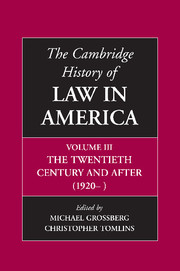Book contents
- Frontmatter
- 1 Law and the State, 1920–2000: Institutional Growth and Structural Change
- 2 Legal Theory And Legal Education, 1920–2000
- 3 The American Legal Profession, 1870–2000
- 4 The Courts, Federalism, and The Federal Constitution, 1920–2000
- 5 The Litigation Revolution
- 6 Criminal Justice in the United States
- 7 Law and Medicine
- 8 The Great Depression and the New Deal
- 9 Labor’s Welfare State: Defining Workers, Constructing Citizens
- 10 Poverty law and income Support: From the Progressive Era to the War on Welfare
- 11 The Rights Revolution in the Twentieth Century
- 12 Race and Rights
- 13 Heterosexuality as a Legal Regime
- 14 Law and the Environment
- 15 Agriculture and the State, 1789–2000
- 16 Law and Economic Change During the Short Twentieth Century
- 17 The Corporate Economy: Ideologies of Regulation and Antitrust, 1920–2000
- 18 Law and Commercial Popular Culture in the Twentieth-Century United States
- 19 Making Law, Making War, Making America
- 20 Law, Lawyers, and Empire
- Bibliographic Essays
- Notes on Contributors
- Index
- References
9 - Labor’s Welfare State: Defining Workers, Constructing Citizens
Published online by Cambridge University Press: 28 November 2008
- Frontmatter
- 1 Law and the State, 1920–2000: Institutional Growth and Structural Change
- 2 Legal Theory And Legal Education, 1920–2000
- 3 The American Legal Profession, 1870–2000
- 4 The Courts, Federalism, and The Federal Constitution, 1920–2000
- 5 The Litigation Revolution
- 6 Criminal Justice in the United States
- 7 Law and Medicine
- 8 The Great Depression and the New Deal
- 9 Labor’s Welfare State: Defining Workers, Constructing Citizens
- 10 Poverty law and income Support: From the Progressive Era to the War on Welfare
- 11 The Rights Revolution in the Twentieth Century
- 12 Race and Rights
- 13 Heterosexuality as a Legal Regime
- 14 Law and the Environment
- 15 Agriculture and the State, 1789–2000
- 16 Law and Economic Change During the Short Twentieth Century
- 17 The Corporate Economy: Ideologies of Regulation and Antitrust, 1920–2000
- 18 Law and Commercial Popular Culture in the Twentieth-Century United States
- 19 Making Law, Making War, Making America
- 20 Law, Lawyers, and Empire
- Bibliographic Essays
- Notes on Contributors
- Index
- References
Summary
This chapter analyzes the emergence of labor law as a distinct field. It examines the discursive and political struggles that gave birth to state regulation of collective bargaining, the passage of employment standards legislation, and the growth of social provision during the first half of the twentieth century. Definitions of work and worker, embedded in legislation and upheld by courts, proved crucial not only for civil rights on the job but also for citizenship rights in the developing welfare state. These rights, whether to old age insurance and unemployment or to minimum wages and union representation, depended on an individual’s social as well as occupational position and, for those programs subject to discretionary implementation in the states, even geographical location. By equating work with wage labor, excluding motherwork and other forms of caregiving, law and social policy privileged the adult man in his prime as the ideal worker. The needs and experiences of the industrial worker, predominantly white men, constituted the norm; the woman, pregnant, immigrant, disabled, older, child, and African American worker was considered a special type, requiring protection when not prohibited from the workforce or relegated to lower paid and intermittent labor.
The standard story told by generations of historians since the 1940s celebrates the New Deal and the labor law regime that nourished and was made possible by the rise of industrial unionism, especially the Congress of Industrial Organizations (CIO). But this veneration of collective bargaining and mass organization of basic industry obscures the larger contours of welfare state development for which constructions of work and worker were fundamental.
- Type
- Chapter
- Information
- The Cambridge History of Law in America , pp. 319 - 358Publisher: Cambridge University PressPrint publication year: 2008
References
- 4
- Cited by



